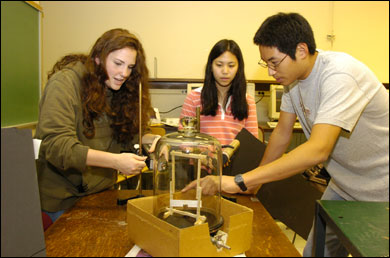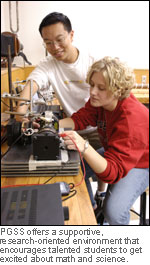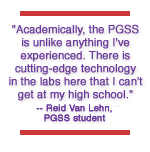|
|
||||
|
|
PGSS Encourages High School Seniors To Embrace Science
Gabriella Cosma moves around the lab with confidence, running samples in the spectrophotometer while coordinating with her lab partners and explaining to visitors the sophisticated biotechnologies she was using to make bacteria glow green, yellow or blue. Transforming bacteria with a fluorescent protein is a technique common to many biology laboratories, but Cosma, who will be a senior at her high school in Exeter, Pa., never did anything like it until this summer.
Cosma looks and acts at home in the lab after only three weeks at the Pennsylvania Governor's School for the Sciences (PGSS) at Carnegie Mellon. While her classmates back home may label such behavior nerdy, here Cosma does not have to deal with such misconceptions and feels comfortable doing what she loves—biology.
"You can be yourself," she said. "No one laughs at you because you like science."
Offering such a supportive and research-oriented environment encourages talented students to pursue careers in the sciences—a key to maintaining the United States' position as a leader in the field. In recent years there has been a decline in the number of American students training to become scientists and engineers, although the number of jobs requiring such training continues to rise, according to the National Science Board. Amid growing concern that the United States is losing its competitive edge to China and other countries, the PGSS has been successful at cultivating young scientists. Virtually 100 percent of PGSS alumni attend the best colleges and universities in the country and continue their education in graduate or professional schools, Many PGSS alumni have gone on to successful careers as medical doctors, engineers, research scientists and professors.
"Academically, the PGSS is unlike anything I've experienced. There is cutting-edge technology in the labs here that I can't get at my high school," said Reid Van Lehn, a student at Shadyside Academy in Pittsburgh.
Mollie Schwartz, who will be a senior at her high school in Danville, Pa., agrees. "It's cool to be at the forefront of scientific advancements. We're doing things here that haven't been done before. We're working with professors whose research is shaping what science is today."
The experience is nothing short of transformational for some students. Amanda Paulovich, a geneticist and oncologist who trained with a Nobel Laureate and now works at the Fred Hutchinson Cancer Research Center, says that the PGSS changed her life.
"The PGSS was a life-altering experience. I didn't have a lot of exposure to science at my high school. The PGSS opened my eyes to a world of possibilities I didn't know existed. While I was at the PGSS, I became completely passionate about basic research," said Paulovich, a 1983 alumna.
For many students, like Paulovich, the PGSS experience helps them make an informed decision about whether science is what they want to do with their lives. Todd Mowry, a 1983 PGSS alumnus who is now an associate professor of computer science at Carnegie Mellon and head of Intel Research Pittsburgh, also points to the PGSS as the inspiration to pursue a career in computer science.
For Cosma, the PGSS experience strengthened her decision to pursue a biology degree, but it also opened her eyes to all that science has to offer. "I didn't realize how vast science is. It's mind boggling."
Amy Pavlak |
||
|
Carnegie Mellon Home |
||||

 "These students find themselves, for the first time, in an environment in which everyone is academically talented and excited about math and science. They have redefined who their peers are and can excel at practicing and studying these disciplines," said Barry Luokkala, director of the PGSS and a teaching professor in Carnegie Mellon's
"These students find themselves, for the first time, in an environment in which everyone is academically talented and excited about math and science. They have redefined who their peers are and can excel at practicing and studying these disciplines," said Barry Luokkala, director of the PGSS and a teaching professor in Carnegie Mellon's  Nearly 2,000 talented Pennsylvania high school students have participated in the PGSS since its 1982 inception. During their intensive five-week program, PGSS students experience educational and research activities not normally available to them through their high schools. They participate in core courses covering the latest advances in biology, chemistry, physics, mathematics and computer science, as well as elective courses on such topics as astrophysics, materials science and the physiological effects of microgravity. In addition to their rigorous class schedule, students spend four afternoons each week in the lab either participating in a formal lab class or working on their team projects. This year's team projects include a study of gene expression in the sea urchin embryo, synthesis and characterization of nanomaterials called Buckyballs, building a model magnetic levitating train and using artificial intelligence to create a computer backgammon player.
Nearly 2,000 talented Pennsylvania high school students have participated in the PGSS since its 1982 inception. During their intensive five-week program, PGSS students experience educational and research activities not normally available to them through their high schools. They participate in core courses covering the latest advances in biology, chemistry, physics, mathematics and computer science, as well as elective courses on such topics as astrophysics, materials science and the physiological effects of microgravity. In addition to their rigorous class schedule, students spend four afternoons each week in the lab either participating in a formal lab class or working on their team projects. This year's team projects include a study of gene expression in the sea urchin embryo, synthesis and characterization of nanomaterials called Buckyballs, building a model magnetic levitating train and using artificial intelligence to create a computer backgammon player.